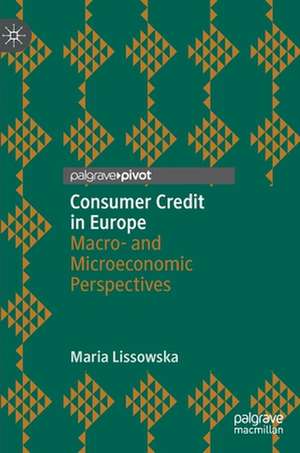Consumer Credit in Europe: Macro- and Microeconomic Perspectives
Autor Maria Lissowskaen Limba Engleză Hardback – 25 noi 2021
These new financial services need adapted legislation. The recently published project of Consumer Credits Directive covers new means of communication, such as smartphones, and extends rules to new ways of crediting, like crowdfunding.
Consumer credit availability changed the behaviour of households. The propensity of poorer households to save faded due to the ease of getting credit. However, financial insecurity during the Coronavirus pandemic made households limit credits and build precautionary savings.
Preț: 451.48 lei
Nou
Puncte Express: 677
Preț estimativ în valută:
86.40€ • 89.87$ • 71.33£
86.40€ • 89.87$ • 71.33£
Carte disponibilă
Livrare economică 24 martie-07 aprilie
Preluare comenzi: 021 569.72.76
Specificații
ISBN-13: 9783030882303
ISBN-10: 3030882306
Pagini: 109
Ilustrații: XIV, 129 p. 9 illus., 2 illus. in color.
Dimensiuni: 148 x 210 mm
Greutate: 0.35 kg
Ediția:1st ed. 2021
Editura: Springer International Publishing
Colecția Palgrave Macmillan
Locul publicării:Cham, Switzerland
ISBN-10: 3030882306
Pagini: 109
Ilustrații: XIV, 129 p. 9 illus., 2 illus. in color.
Dimensiuni: 148 x 210 mm
Greutate: 0.35 kg
Ediția:1st ed. 2021
Editura: Springer International Publishing
Colecția Palgrave Macmillan
Locul publicării:Cham, Switzerland
Cuprins
1. Trends and role of consumer credits in the European economy.- 2. Changing credit landscape.- 3. The role of consumer credits in the life of an European household.- 4. Regulatory and organisational context of consumer credits in Europe.- 5. Conclusion.
Notă biografică
Maria Lissowska is a professor of economics at the Warsaw School of Economics. Her research focuses on institutional and financial economics. In 2007 – 2018 she was an official of the European Commission, specifically responsible for analysis and legislation of consumer credits. She then returned to research and now publishes on financial issues including consumer credits and crowdfunding.
Textul de pe ultima copertă
This book provides a comprehensive outlook on the state and role of consumer credits in the European economy and households. It underlines the role of consumerism and digitalisation, in the framework of legislation. It covers two major turns in consumer credit evolution: the 2008 crisis and Covid pandemic. The first had socio-economic sources, the second one was an external event, but provoked important changes in consumer behaviour. Lockdowns deepened the preference for digital financial products. FinTech and BigData operators acquired broader opportunities with the development of distance services.
These new financial services need adapted legislation. The recently published project of Consumer Credits Directive covers new means of communication, such as smartphones, and extends rules to new ways of crediting, like crowdfunding.
Consumer credit availability changed the behaviour of households. The propensity of poorer households to save faded due to the ease of getting credit. However, financial insecurity during the Coronavirus pandemic made households limit credits and build precautionary savings.
Maria Lissowska is a professor of economics at the Warsaw School of Economics. Her research focuses on institutional and financial economics. In 2007 – 2018 she was an official of the European Commission, specifically responsible for analysis and legislation of consumer credits. She then returned to research and now publishes on financial issues including consumer credits and crowdfunding.
These new financial services need adapted legislation. The recently published project of Consumer Credits Directive covers new means of communication, such as smartphones, and extends rules to new ways of crediting, like crowdfunding.
Consumer credit availability changed the behaviour of households. The propensity of poorer households to save faded due to the ease of getting credit. However, financial insecurity during the Coronavirus pandemic made households limit credits and build precautionary savings.
Maria Lissowska is a professor of economics at the Warsaw School of Economics. Her research focuses on institutional and financial economics. In 2007 – 2018 she was an official of the European Commission, specifically responsible for analysis and legislation of consumer credits. She then returned to research and now publishes on financial issues including consumer credits and crowdfunding.
Caracteristici
Provides a comprehensive outlook on the state and role of consumer credits Covers two major turns in consumer credit evolution Extends rules to new ways of crediting, like crowdfunding
